Menu

WINTER 2024

For all of us in North Carolina’s free and charitable clinic world, 2024 will be a year of challenges and adaptation as we begin to understand exactly how the state’s expansion of Medicaid eligibility will affect how we serve the communities we serve.
Less than two months into expansion, we know that our 69 member clinics across the state will see some current patients make the transition to a Medicaid provider – depending on how many meet the new income threshold and other Medicaid eligibility requirements.
In other states that have experienced expansion, some free and charitable clinics responded by pivoting to new operating models – for example, switching to a dental-only format to serve the uninsured and meet oral health needs of Medicaid beneficiaries that expansion didn’t address.
Individual clinics will make changes they feel are in the best interests of the communities they are so dedicated to serving. As Rufus Phillips, executive director of Virginia’s state association, puts it, “Free and charitable clinics have a superpower of knowing how to fill the gaps.”
At the same time, the North Carolina Association of Free and Charitable Clinics is committed to reaffirming our mission and vision – that every North Carolinian should have access to high-quality, affordable health care regardless of their ability to pay.
Medicaid expansion is a tremendous step forward for the cause of a healthy North Carolina, but it won’t alter the fact that as many as 700,000 of our state’s most vulnerable residents will remain uninsured and in need of the no-cost and low-cost health care our clinics provide.
Nor will expansion alter that fact that for many decades free and charitable clinics have held the unique distinction of being the only “safety net” providers primarily focused on serving the uninsured and underinsured in our state.
It’s in our DNA, from the earliest days of our modest beginnings in church basements, the back room of a neighborhood market, or a closet in a private practice, when we saw a community need that wasn’t being met and found the funding and volunteer support to meet it.
It’s important that all of those who have helped our clinics grow and become a vital component of the safety net understand that no matter what else changes, providing a medical home for the uninsured and underinsured will remain the primary focus of free and charitable clinics.
New membership standards discussed by our members at our leadership summit last spring and adopted by the NCAFCC board in November will help ensure that we stick to our mission while giving all members a way to benefit from the NCAFCC membership level they choose.
One observation continues to resonate with me from the panel on Medicaid expansion at our annual members’ meeting in November. Phyllis Albritton, head of Colorado’s state association, noted that clinics gained as many new uninsured patients as they lost to expansion. In fact, Phyllis predicted that by late 2024, the number of her state’s uninsured will equal the number before Colorado adopted expansion in 2013.
“You may actually lose patients (who become eligible for Medicaid) – and your staff will grieve – but your numbers will not change,” Phyllis advised.
As the French say, the more things change, the more they stay the same. North Carolina’s uninsured and underinsured need us more than ever, now and into the future. We must continue to strengthen our network of free and charitable clinics so we can be here for them.
April Cook
Chief Executive Officer
North Carolina’s free and charitable clinics are set to make unprecedented gains in 2024 in expanding access to oral health care for uninsured and underinsured North Carolinians who are unable to afford regular visits to the dentist.
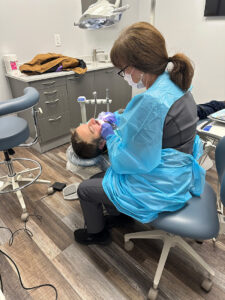
From the mountains to the sea, NCAFCC member clinics will welcome patients to new or expanded brick-and-mortar facilities and a new mobile dental clinic, adding to the momentum created by several projects that launched in late 2023.
Elsewhere, member clinics will be adding to their networks of paid and volunteer providers so they can make oral health care services available to more of their patients. Their efforts mean that thousands of North Carolinians will finally get the dental care they need.
Adding and expanding oral health care is an important step toward providing truly integrated health care and achieving the vision of North Carolina’s free and charitable clinics – that all North Carolinians should have access to quality health care regardless of ability to pay.
For many of the 700,000 N.C. residents expected to remain uninsured and ineligible for Medicaid even following expansion, our clinics will provide big gains in oral health outcomes in 2024 – in some cases better than newly eligible Medicaid beneficiaries unable to find a dentist willing to take on new patients.
As North Carolina Health News reported in a story Dec. 14, those beneficiaries face an uphill struggle in a state where only 45% of all dentists accept Medicaid patients and many of those who do are not accepting new Medicaid patients including those eligible since Dec. 1 when expansion took effect.
The problem is compounded by a statewide shortage of dentists, with 94 of North Carolina’s 100 counties considered federally designated dental health professional shortage areas. Shortages also exist in parts of the other six counties but are most severe in rural counties that can’t attract new dentists.
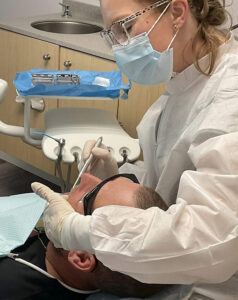
In all, according to the NCAFCC’s annual outcomes survey, reporting member clinics provided 12,395 dental visits for clinic patients in 2022 and delivered more than $6.9 million in oral health care services through on-site visits at free and charitable clinics or via referrals to an off-site provider.
Here’s a sampling of the many initiatives involving the NCAFCC and its member clinics that have recently come to fruition or are expected to in 2024:
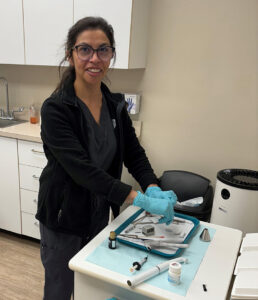
Good oral health is a key to overall health, and our clinics in 2024 will give our state’s most vulnerable residents a shot at better health and improved quality of life by treating their urgent oral health needs and providing the regular care needed to prevent debilitating health issues.
That’s something we can all smile about.
By ALICE BRITT JACKSON
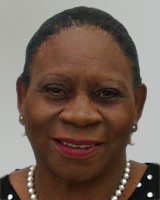
Diversity, Equity and Inclusion, often abbreviated as DEI, remain inside the fabric of our lives, interwoven in our daily existence. Despite recent occurrences that could unravel various threads of this profoundly significant human tapestry, DEI remains intact, its importance innately held together by each of us.
Awareness of the tremendous need for diversity, equity and inclusion has not gone away. Rather, recent activities have heightened its prominence, magnifying its original significance as even more necessary. What happened? How did the threads begin to loosen? What triggered the onslaught of negative commentary in the news, on social media, at events and now workplaces?
Just over eight months ago, the Supreme Court struck down affirmative action in college admissions, but the real catalyst that has prompted a second look at DEI began over three years ago with George Floyd’s demise and other brutal occurrences. Social justice campaigns followed and elevated diversity, equity, and inclusion (DEI) initiatives across the nation. NCAFCC followed, at that time, with a declaration to uphold health care for all in its many endeavors. We formalized a health equity commitment and affirmed our support of DEI across our membership. The new magnifying glass, placed recently on DEI, DEIA, DEIB, DEIA/CI (depending on which acronym fits the focus), is stimulating a reexamination of the many unique strategies designed to filter authentic, natural respect and value for each other.
The Supreme Court’s decision on affirmative action in student admissions has sparked newfound interest in how all workplaces are promoting diversity, equity and inclusion. NCAFCC and its Member Clinics already know that DEI programs are proven strategies for workplaces, especially in health care. Yet the recent national spotlight on DEI has stimulated the opportunity for new reflection, review, and even revision of current DEI approaches. It’s all good stuff for those in the free and charitable arena because the benefactors are the uninsured and underserved seeking equitable medical care.
 So, what again is DEI? Here’s how the concept is described in a webinar from Relias Inc., a tech-based provider of workforce development and enablement solutions for the health-care industry: “Diversity, Equity, and Inclusion (DEI) represent distinctive approaches, programs and policies that encourage representation and participation of diverse groups of people, including people of different genders, races, ethnicities, abilities and disabilities, religions, cultures, ages, and sexual orientations and people with diverse backgrounds, skills and expertise.”
So, what again is DEI? Here’s how the concept is described in a webinar from Relias Inc., a tech-based provider of workforce development and enablement solutions for the health-care industry: “Diversity, Equity, and Inclusion (DEI) represent distinctive approaches, programs and policies that encourage representation and participation of diverse groups of people, including people of different genders, races, ethnicities, abilities and disabilities, religions, cultures, ages, and sexual orientations and people with diverse backgrounds, skills and expertise.”
The U.S. Department of Health and Human Services defines the elements of DEI as follows:
What does data tell us? Relias recently released a 2023 State of Healthcare Training and Staff Development Report, which identifies shifts in the healthcare education and workforce environment over the previous two years. Relias gathered insights from 3,908 respondents, including leaders, learning and development (L&D) staff, and individual contributors.
The report’s Finding #2 addresses diversity, equity and inclusion in the workplace: “Looking at organizational cultures in terms of diversity, equity, inclusion, and belonging (DEIB), about a third of participants said their organization’s culture had improved in the last year (managers 33%, individual contributors 29%). Most said it had stayed about the same (managers 64%, individual contributors 68%), and only a small percentage said it had worsened (managers 3%, individual contributors 3%).” The takeaway, according to Relias, is that it is clear “manager and employee education, ongoing conversations, and action on DEIB issues are important ways that leaders can support their employees in feeling a sense of belonging and promoting collaboration at work”.
Diversity, equity, and inclusion (DEI) programs will remain valuable for employers, especially in the healthcare environments. Healthcare organizations need to prioritize DEI to mitigate negative patient outcomes and increase the ability to provide high-quality patient care, improve employee retention, and elevate training practices. DEI creates, across a work environment, a stronger operational alignment, greater team cohesion, and a stronger commitment to genuinely help another colleague achieve, thus uplifting overall work dynamics.
The successful beginning, for any DEI program in the workplace, is from a place of authenticity, especially for those staff charged with implementation of the strategies. DEI staff leaders first have to define their own individual perspectives and feelings about the principles of diversity, equity, and inclusion. Then, leadership should positively encircle staff with a vision for the workplace, allowing individualism within the domain of the work environment to emerge, while stimulating creativity, personal esteem, and better productivity. Within every staff member, DEI awareness begins differently, then merges into a full platform of respect, trust and cooperation among all team members. When the attributes of an active DEI program are in effect, individuals evolve from employees to stakeholders in the mission and services. Positive change begins to occur daily in the workplace.
If no DEI platform currently exists, now is the time to (1) launch a situational analysis; (2) review past data; (3) conduct strategic discussions; (3) design a preliminary plan identifying key areas of focus; (4) engage expertise to validate the chosen approaches; and, (5) move carefully towards building a DEI platform with the right strategies to support both staff and patients, in an equitable and inclusive way
Finally, intentional communication of an organization’s core values, from a DEI perspective, will help the community know and be willing to uphold the value system of that organization. Ultimately, DEI strategies do more for one as well as for many—in the workplace and beyond the clinic door.
Alice Britt Jackson (Alice Mae) is Director of Development and Health Equity for the North Carolina Association of Free and Charitable Clinics.
DEI Acronyms:
DEI/Diversity, Equity, and Inclusion DEIA: Diversity, Equity, Inclusion and Accessibility DEIB/Diversity, Equity, Inclusion and Belonging DEIA-CI/Diversity, Equity, Inclusion and Accessibility-Conscious Inclusion
DEI Resources
Affirmity | The Future of Diversity, Equity, Inclusion, and Belonging 2023
What’s the current state of Diversity, Equity, Inclusion, and Belonging practice and what’s the outlook for the future? This 2023 edition of HR Research Institute’s white paper has surveyed a range of organizations on the maturity, effectiveness, and resourcing of their DEIB programs, and draws up a list of practices most closely associated with success.
How Diversity, Equity, and Inclusion Can Influence Healthcare | Relias DEI Definitions and Strategies to promote DEI in your healthcare organization
DEI in Healthcare Improves Retention and Patient Outcomes (relias.com) webinar
A workplace culture that embraces diversity and fosters inclusion benefits employers, increases employee productivity, and is good for the bottom line. In healthcare this bottom line includes the crucial outcome of patient health and retention of passionate, competent staff. In this on-demand webinar, experts from Relias and partner Business & Learning Resources (BLR®), an industry-leading knowledge provider, examine why DEI programming needs to be a core component of your healthcare business strategy—from HR initiatives to everyday patient-provider interactions.
40+ Diversity and Inclusion Questions to Connect Better with Your Team | Ongig Blog To talk about Diversity, Equity, Inclusion, and Belonging (DEIB) topics at your organization, you can start by creating a DEIB survey. A DEIB survey is a tool that can help you understand how equitable and inclusive your workplace is. It can also help you listen to the voices of your employees, know their perspectives, and make the necessary changes.
Diversity, Equity, and Inclusion Resources for Healthcare (relias.com)
Complete with industry insights, solutions, and implementation strategies, this toolkit will provide you with resources to promote DEI initiatives that work for your organization: (1) Strategies and solutions to elevate your DEI initiatives; (2) How DEI can influence every component of your business strategy from HR initiatives to the patient-provider experience; and, (3) Insight into various mental and physical social determinants of health.
One of the highlights of the NCAFCC’s annual members’ meeting is the unveiling of the winners of our three annual awards – the Spirit of Free and Charitable Clinics Award, the Don Lucey Award, and the Leadership Award.
These awards honor individuals who stand out for their contributions to free and charitable clinics as clinic leaders and volunteers. If you’re in need of some extra inspiration, the stories of the 2023 honorees recognized at our November meeting will provide it.
The Spirit of Free and Charitable Clinics Award: Elizabeth Young, Hunger and Health Coalition
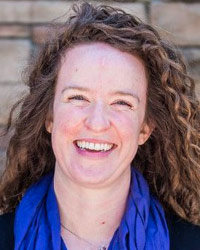
It was with a great sense of honor but also with a heavy heart that we announced the winner of the 2023 Spirit of Free and Charitable Clinics Award, the late Elizabeth Young, who served as executive director of Hunger and Health Coalition in Boone from 2014 until illness prevented her from continuing. Elizabeth passed in August 2023.
The Spirit of Free and Charitable Clinics Award is unique in that it is given by the NCAFCC staff to an individual who has distinguished themselves by the spirit of their service to their patients and community. Elizabeth has left an indelible impression on all who knew her, on her community and the countless others who had the immense honor and joy of simply being in her presence. She was a powerful force for good and a true pioneer in the free and charitable clinic sector.
Jenn Bass, Hunger and Health Coalition’s current executive director, has shared with us how she was inspired by Elizabeth’s inclination to take the harder route if it meant a better tomorrow for the community. If it meant buying local instead of cheaper items “off the mountain” or reimagining how a food pantry approaches food holistically, that’s what she would do.
“Nothing was off limits,” said Jenn. “Nothing was too far out of reach in terms of furthering the mission of the Hunger and Health Coalition.”
The Don Lucey Award: Antonio Puente, PhD, Cape Fear Clinic
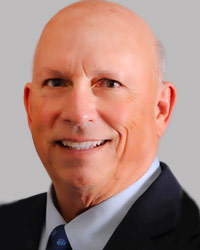
Named for Don Lucey, who for more than 35 years has been a champion of free and charitable clinics, this award is based on nominations from clinic leaders and recognizes a volunteer who has regularly gone above and beyond in service to their clinic. For the past two decades, 2023 winner Antonio Puente, PhD, has done just that for Cape Fear Clinic in Wilmington.
Dr. Puente founded Cape Fear’s on-site mental health program in 2004, making the clinic one of the first free or charitable clinics in the state to offer mental health services, and the only one at the time providing services in English, Spanish and Portuguese. He still serves as co-director of the nationally recognized program, providing clinical supervision, oversight, and direct patient care.
Dr. Puente also served on the Cape Fear Clinic board of directors for more than a decade, including as president from 2010 through 2013, and has played an instrumental role in helping the clinic deliver health care and social services to low-income, uninsured residents in the Wilmington area.
A psychology professor at the University of North Carolina Wilmington (UNCW) since 1981, the Cuban émigré joined the clinic as a translator at the request of his daughter, already a volunteer there. He soon realized that “many of the problems that our patients had were mental health problems.”
“With the help of the staff at the time, we founded (the mental-health program) with the idea that we were here to serve our community,” Dr. Puente said in accepting the award. “Looking at what the award stands for and who the award is named after, I can’t tell you how humbled I am and how thrilled I am, not only for myself but for our clinic as well as our community.”
The Leadership Award: Sommer Wisher, Wake Smiles
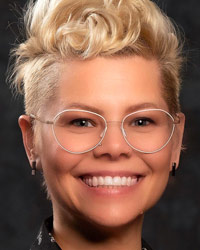
The Leadership Award is the newest award given by the NCAFCC staff to an individual who has demonstrated exceptional leadership across the membership. Strong leaders abound throughout the NCAFCC membership, so this award is in recognition of a very special leader who has gone above and beyond in committing their time, talents and positive energy to helping others also lead well.
Our 2023 winner is Sommer Wisher, executive director of Wake Smiles in Raleigh, one of the handful of dental-only clinics among our NCAFCC membership. Sommer is one of our newest clinic leaders, and although Wake Smiles is relatively new to our membership, she has taken on numerous roles in 2023 to support her free and charitable colleagues.
Wake Smiles, for example, is now supporting via referrals the oral health-care needs of five free and charitable clinics who have patients from Wake County. The clinic recently added Samaritan Health Center in Durham and Shepherd’s Care Medical Clinic in Zebulon to three it was previously serving.
Sommer serves as Region 6 representative and fully embraces the spirit and vision of regionalization among her colleagues. From leading a creative teambuilding session at NCAFCC’s 2023 Leadership Summit to joining the NCAFCC board, Sommer continues to say “yes” – with a smile – to leading well.
To all of our 2023 annual award honorees, the North Carolina Association of Free and Charitable Clinics congratulates you. And on behalf of the association and all of our member clinics, we thank you for your service to the cause of expanding access to high-quality health care regardless of ability to pay!
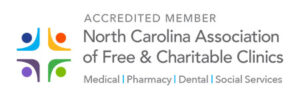 The North Carolina Association of Free and Charitable Clinics (NCAFCC) Accreditation Program offers our members the opportunity to strengthen their programs and services by demonstrating their compliance to standards shared by similar organizations. The program is a voluntary process and quality improvement tool that members may use to evaluate their services and initiate improvement for the overall health of their organizations.
The North Carolina Association of Free and Charitable Clinics (NCAFCC) Accreditation Program offers our members the opportunity to strengthen their programs and services by demonstrating their compliance to standards shared by similar organizations. The program is a voluntary process and quality improvement tool that members may use to evaluate their services and initiate improvement for the overall health of their organizations.
Obtaining NCAFCC accreditation status signals to all the accredited member’s values and commitment to performance and provides recognition that its services are meeting NCAFCC standards of quality and excellence. NCAFCC accreditation status, which is effective for three years, can strengthen the member organization’s position in the community and bring multiple benefits to the organization by:
Please join us in congratulating the following members for re-establishing their NCAFCC Accreditation status in 2023: Community Care Clinic, Boone; DEAC, Winston-Salem; Free Clinic of Rockingham County, Reidsville; John P. Murray Community Care Clinic, Albemarle; Moore Free and Charitable Clinic, Southern Pines; Open Door Clinic of Alamance County, Burlington; and WATCH, Goldsboro.
If your organization is interested in pursuing NCAFCC accreditation status, contact Cindy@ncafcc.org